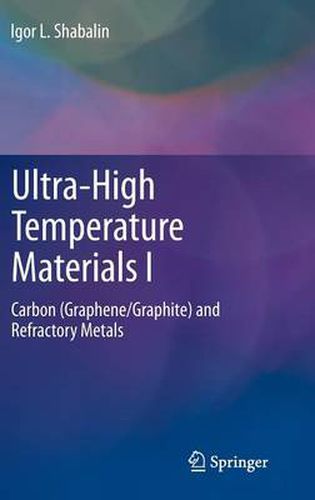Readings Newsletter
Become a Readings Member to make your shopping experience even easier.
Sign in or sign up for free!
You’re not far away from qualifying for FREE standard shipping within Australia
You’ve qualified for FREE standard shipping within Australia
The cart is loading…






This title is printed to order. This book may have been self-published. If so, we cannot guarantee the quality of the content. In the main most books will have gone through the editing process however some may not. We therefore suggest that you be aware of this before ordering this book. If in doubt check either the author or publisher’s details as we are unable to accept any returns unless they are faulty. Please contact us if you have any questions.
This exhaustive work in three volumes with featuring cross-reference system provides a thorough overview of ultra-high temperature materials - from elements and chemical compounds to alloys and composites. Topics included are physical (crystallographic, thermodynamic, thermo-physical, electrical, optical, physico-mechanical, nuclear) and chemical (solid-state diffusion, interaction with chemical elements and compounds, interaction with gases, vapours and aqueous solutions) properties of the individual physico-chemical phases and multi-phase materials with melting (or sublimation) points over or about 2500 DegreesC. The first volume focuses on carbon (graphite/graphene) and refractory metals (W, Re, Os, Ta, Mo, Nb, Ir). The second and third volumes are dedicated solely to refractory (ceramic) compounds (oxides, nitrides, carbides, borides, silicides) and to the complex materials - refractory alloys, carbon and ceramic composites, respectively. It will be of interest to researchers, engineers, postgraduate, graduate and undergraduate students in various disciplines alike. The reader is provided with the full qualitative and quantitative assessment for the materials, which could be applied in various engineering devices and environmental conditions at ultra-high temperatures, on the basis of the latest updates in the field of physics, chemistry, materials science, nanotechnology and engineering.
$9.00 standard shipping within Australia
FREE standard shipping within Australia for orders over $100.00
Express & International shipping calculated at checkout
This title is printed to order. This book may have been self-published. If so, we cannot guarantee the quality of the content. In the main most books will have gone through the editing process however some may not. We therefore suggest that you be aware of this before ordering this book. If in doubt check either the author or publisher’s details as we are unable to accept any returns unless they are faulty. Please contact us if you have any questions.
This exhaustive work in three volumes with featuring cross-reference system provides a thorough overview of ultra-high temperature materials - from elements and chemical compounds to alloys and composites. Topics included are physical (crystallographic, thermodynamic, thermo-physical, electrical, optical, physico-mechanical, nuclear) and chemical (solid-state diffusion, interaction with chemical elements and compounds, interaction with gases, vapours and aqueous solutions) properties of the individual physico-chemical phases and multi-phase materials with melting (or sublimation) points over or about 2500 DegreesC. The first volume focuses on carbon (graphite/graphene) and refractory metals (W, Re, Os, Ta, Mo, Nb, Ir). The second and third volumes are dedicated solely to refractory (ceramic) compounds (oxides, nitrides, carbides, borides, silicides) and to the complex materials - refractory alloys, carbon and ceramic composites, respectively. It will be of interest to researchers, engineers, postgraduate, graduate and undergraduate students in various disciplines alike. The reader is provided with the full qualitative and quantitative assessment for the materials, which could be applied in various engineering devices and environmental conditions at ultra-high temperatures, on the basis of the latest updates in the field of physics, chemistry, materials science, nanotechnology and engineering.